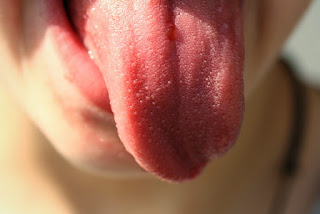Tongue Scraping: The Why and How
Many times, we go to the dentist with the idea that our oral health is focused, first and foremost, on the teeth and gums. However, we should look more at one appendage that is just as crucial when it comes to wellness – the tongue!
We use it to taste, and we use it to talk. But do you know the proper techniques to take care of your tongue?
Ashly Rothrock, a member of dental hygienist team at Artistic Dental, has all of the answers:
“Scraping the tongue removes bacteria and toxins from the surface that can cause bad breath, block taste buds, and interfere with digestion. Harmful bacteria that remain on the tongue surface cause a foul odor resulting in halitosis. Taste buds can be blocked by bacteria which interferes with the ability to taste food and drinks,” fairly straightforward – but a clean tongue can also help dentists identify other problems that may stay hidden in your mouth:
“Abnormalities on the tongue such as lesions and discoloration are easier to detect on a clean, healthy, tongue.”
So, tongue scraping it is. Now we just need to know with what, and how often – “Tongue scraping should be done daily along with brushing, flossing, and rinsing, and there are special tongue scrapers available. Some have plastic ridges and grooves that aid in removal of bacteria. Others have bristles that are a little harder than that on the toothbrush. Since a soft toothbrush is recommended, an additional tongue scraper is helpful to avoid fraying the toothbrush bristles quicker.”
Ashly also noted that many toothbrushes come with scraping mechanisms on the back of the brush head, and that in a pinch, the bristled brush head itself will do.
So along with your regular routine of brushing and flossing don’t forget to include tongue scraping for optimum oral health. If you have any further questions or need to schedule an appointment for a teeth cleaning and checkup be sure to book today. Our end of year appointments are filling up!
